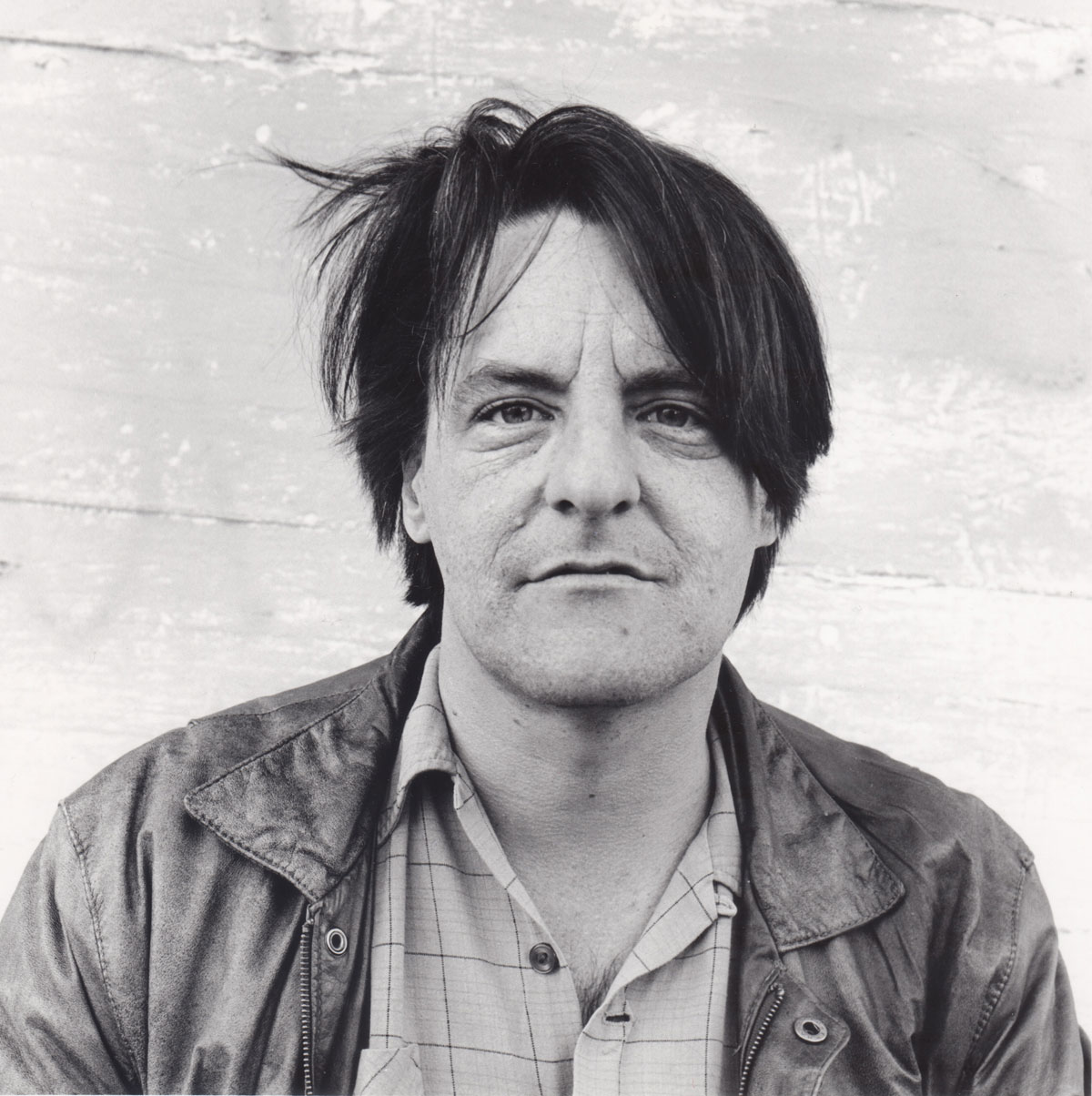
Kevin Killian, San Francisco poet, playwright, novelist, arts writer, photographer and teacher, died on June 15 at age 66.
Known as a prolific writer of queer literature and a central figure—along with his wife and fellow writer Dodie Bellamy—in San Francisco’s “New Narrative” literary scene, Kevin was the author of three novels, a memoir, three short-story collections, four poetry collections, over 30 plays for the San Francisco Poets Theater and 2,639 Amazon reviews. Together, Dodie and Kevin edited the literary and art journal Mirage #4/Period(ical) and the 2017 anthology Writers Who Love Too Much: New Narrative Writing, 1977–1997.
Within the Bay Area arts milieu, Kevin was a consummate supporter. He wrote regularly and generously about local artists and spaces for publications like Art in America and Open Space. In the hours before 2018 became 2019, I watched him officiate a wedding—gallantly, humorously and with great love.
Following the announcement of his death, the expected outpouring of images, memories and heartfelt eulogies crowded social media timelines. But algorithms are strange and fickle. Combating the fragmented feed, KQED invited those who knew Kevin best to fill the rest of us in on a lifetime of stories, absurdist plays and warm gestures. Only by better knowing him can we follow Alvin Orloff’s advice in his 48 Hills remembrance piece, where he writes, “We must try and be more like Kevin.”
A memorial celebration for Kevin Killian will be held at SFMOMA’s Phyllis Wattis Theater on Aug. 25, time to be announced. —Sarah Hotchkiss
When I think of Kevin, I think of lots of things, most of them so simple or maybe complicated as to be almost ineffable: his kindness, his huge talent and louche, throw-away grace; the way he’d walk into a room carrying a nylon collapsible tote-bag which, as he carried it, became the most glamorous normcore object in the world; or the way he’d stand beside a podium, bowing at the end of something, spreading his arms dramatically, all lit up; and now the way he lay in the high dim the night before he left us, so utterly himself even as he was becoming something else.
—Donna de la Perrière, poet
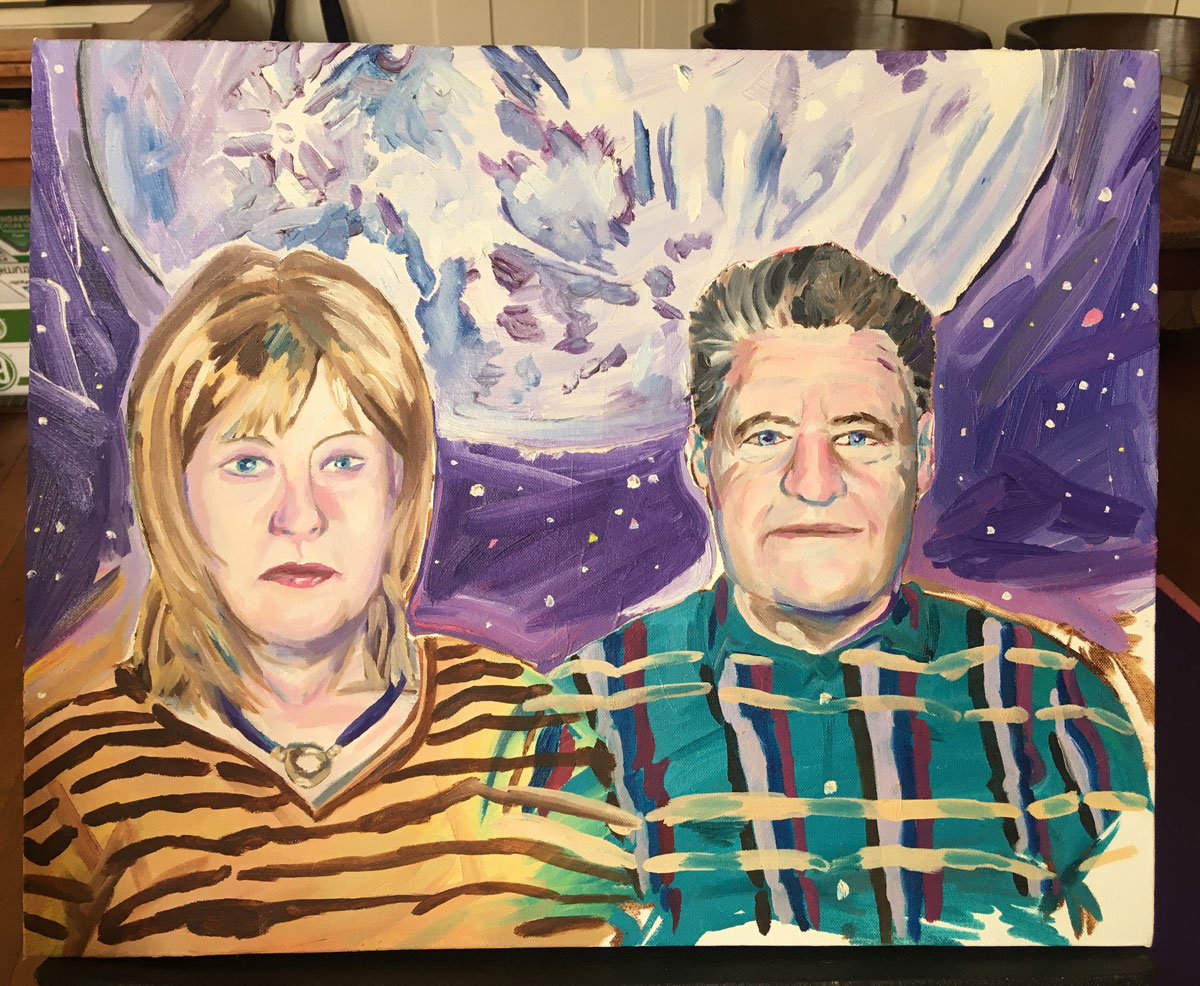
Does anyone know who painted this picture? Kevin gave it to me during the summer writing workshop his wife Dodie Bellamy teaches in their apartment. I noticed it right away (Kevin collects, so the scenery at their place changes). I love how they are enmeshed by overlapping shirt patterns.
“Kevin I love that painting.”
“You can have it, Anne,” and he took it off the wall and gave it to me.
The portrait is from their wedding anniversary series, a new commission every year. To me, it reads: Kevin and Dodie as played by Stevie Nicks and David Lynch. Doubles, doppelgängers, sat in front of a full moon.
More than once, I asked Kevin to remind me who painted it, someone at CCA? Thought I jotted that down. Dodie will know. I’ll ask her at class this week. Kevin won’t be there, but he sure will be there. Kevin Killian is dead. Long live Kevin Killian.
—Anne McGuire, artist
One sad day Kevin and I were writing Steve Abbott’s obituary. I can’t remember for what publication, and now that Kevin is gone I’ll never know. Kevin was Steve’s literary executor, a role he filled for Sam D’Allesandro and others probably. How did Kevin have time to do all this?
He was an ardent fan of the soap opera Santa Barbara, and once he told me that he wrote to every person in the cast of every season, and managed to get replies from all of them. But he didn’t always write as Kevin, he wrote in different personas, including two teenage girls. This was a precursor somehow to the thousands of hilarious Amazon reviews he wrote, sometimes about products he never used or books he hadn’t read. Kevin seemed to possess a magician’s secret of happiness—there is meaning everywhere.
As we were writing Steve’s obituary, Kevin dictated, “You never knew who you would meet at the huge round table in Steve’s kitchen, Bruce Boone, Kathy Acker, Dame Margot Fonteyn!”
“Now wait a minute, Kevin. You were never going to meet Margot Fonteyn in Steve’s kitchen.” If there were one place to keep to the facts, it would be an obituary? Kevin looked slightly indignant because I was making the world smaller. He said, “But you could have.”
—Robert Glück, writer
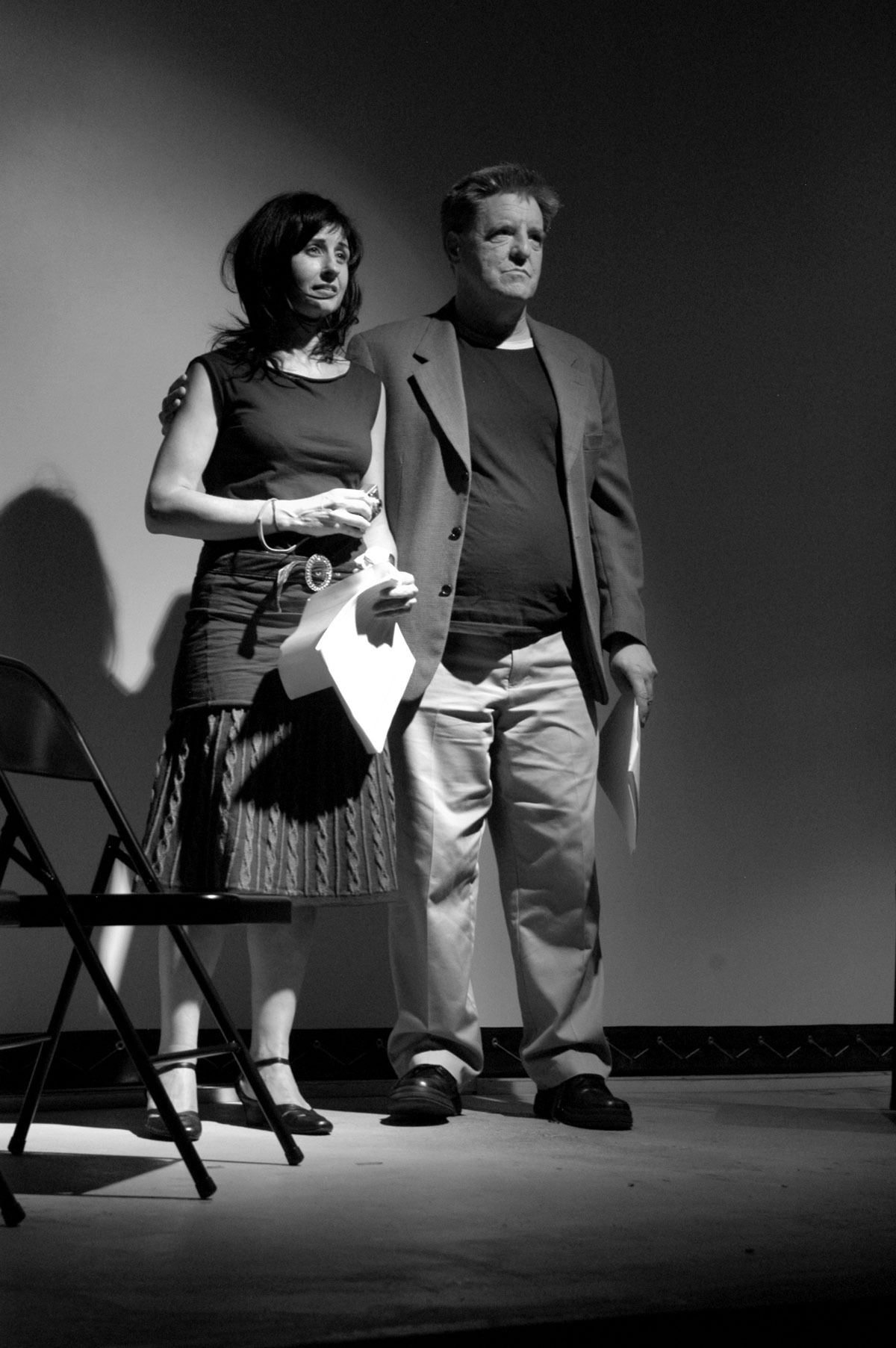
I was so lucky to meet Kevin Killian and be a regular cast member in his Poets Theater plays. Kevin and I also wrote five plays together.
When we performed our play, Celebrity Hospital, a second time, I got this in an email from Kevin:
“When the play ends and Kurt Russell and Kitty Potter join hands, we want to have a music cue of Patti Smith singing ‘People Have the Power.’ Then everyone comes out and joins hands and bows as the music plays and hopefully the audience is clapping.”
We were sad the second time we performed it, because the artist Rex Ray had died and couldn’t reprise his recurring character, Rick Penny. Those were tough shoes to fill. But Kevin stepped in and played the part as a tribute. In an email around then, he wrote about Rex:
“What an angel—of course a wicked one too :-)”
I feel the same about Kevin. Truly an angel sent from above, to inspire, encourage and be joyous with. He’s one of the most giving, supportive, brilliant and funniest people I have ever known, and of course, delightfully nasty!
—Karla Milosevich, artist
Driving with Kevin was a treat. A sense of purpose, mixed with the intimacy of the vehicle, lent the tone of a buddy film. In the world, Kevin had to be shared: everyone loved him, and he gave back an endless supply. In the car, it was just us. One day riding back from Berkeley I mentioned this far-fetched idea: a film based on three obscure sources (two films and a book). A week later, Kevin had seen both movies, read the biography, and written a feature-length script. I felt grateful and undeserving, but not surprised. He never pulled back. He gave us platforms, encouragement and material. When we needed a car in one scene, Kevin lent his. In the driver’s seat I imagined being Kevin Killian: having that generous quality without any Mother Teresa
fuss. Someone you could have a laugh with, and feel total support.
—D-L Alvarez, artist
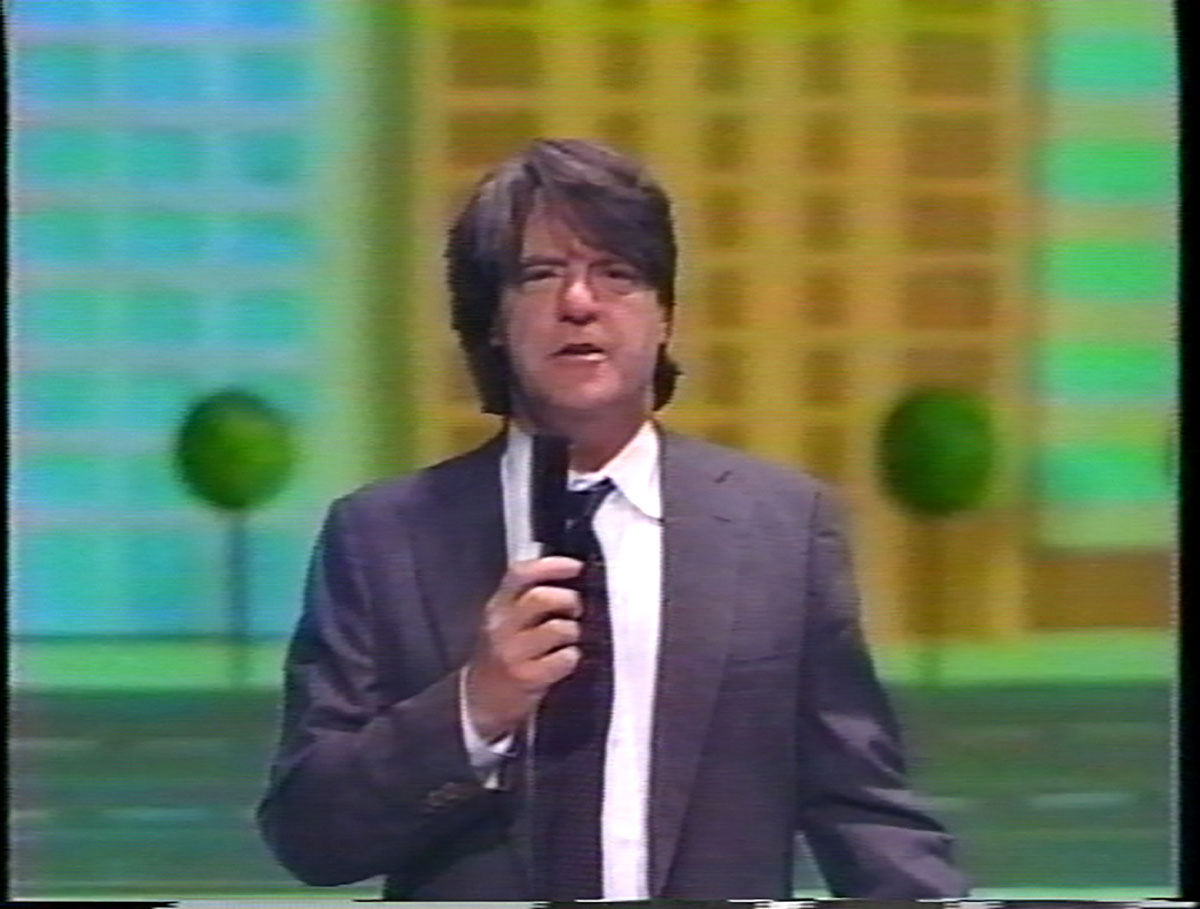
This video still shows Kevin Killian starring as TV reporter Stephen Westerwater in my disaster movie Video 97 (1997). I had just finished my undergrad at SFAI and it took some nerve from me to ask this well-known writer and poet to act in my 20-dollar VHS production. Kevin played the part with abandon and made me feel like I was working on a big box-office hit.
Kevin’s genius was apparent to anyone who had the luck to work with him. Attending his Poets Theater plays always felt like being at the San Francisco equivalent of Warhol’s factory. In
contrast to Warhol, Kevin was all Cinderella and no Dracula. It’s impossible to imagine San Francisco’s artist community without his glamour, kindness and bohemian charm. Love, tears,
and gratitude to Kevin, his wife Dodie Bellamy, and everyone close to him.
—Kota Ezawa, artist
A few summers ago (what are years?), Kevin kindly asked me if I’d pose for his Tagged series of nude portrait photos. My shot at extended mortality! I demurred and said something like, “Maybe if I go into mourning and lose like 20 pounds.” A dumb answer. Who isn’t grieving, most all the time? He replied (and I approximate, the device archive lost this one), “Just the way you are would be just fine with me!”
I keep thinking Kevin wrote a big book titled Kind. (Douglas Oliver already snagged that title, drat!) I don’t know how, but he had an instinct for extending a hand. He’d approach with this question he had stored up that, somehow no fail, his quick mind supplied him, just meant for you. And he’d give it to you, like a gift. With the implicit proviso that what you knew or thought or manufactured in response actually meant something. For those of us slathered over with abjection (and, again?, who isn’t?), it landed like a little proof. Not of one’s humanity, whatever, more like hello friend, “I [too] feel stupid and contagious / Here we are now, entertain us.” (In Tori Amos voice, por favor.)
But yeah, there’s nobody now to ask all the questions that we’d save up to ask Kevin.
–Steve Dickison, poet and writer
I would like to contribute this sound work “Cloud Hands” from I Think You’re Great with Kevin Killian’s vocals reciting a few of the names of the 37 Tai Chi postures. The full CD was recorded for the exhibition overundersidewaysdown at Queen’s Nails Annex, curated by Margaret Tedesco, San Francisco, 2006. Produced by © Aero-Mic’d Records. Wayne Smith (recordings, instruments, SoundEdit16), Kevin Killian (Tai Chi vocals).
—Margaret Tedesco, artist and curator
For Kevin, his collection of signed headshots of the cast of the soap opera Santa Barbara could be just as marvelous as the most avant-garde literature, in turn as important as the latest tidbit of literary gossip or the perfect placement of a B-movie reference in an essay on poetry and AIDS. All life, and all culture, was worthy of sincere attention and the status of art for Kevin, and his devotion to sharing that worldview with others, by generously inviting us all into a community where his form of sociality was collaboration and dish instead of networking or bourgeois niceties, was only part of what made Kevin one of the most unique artists and friend I could have the good fortune to know and love.
—David Buuck, writer
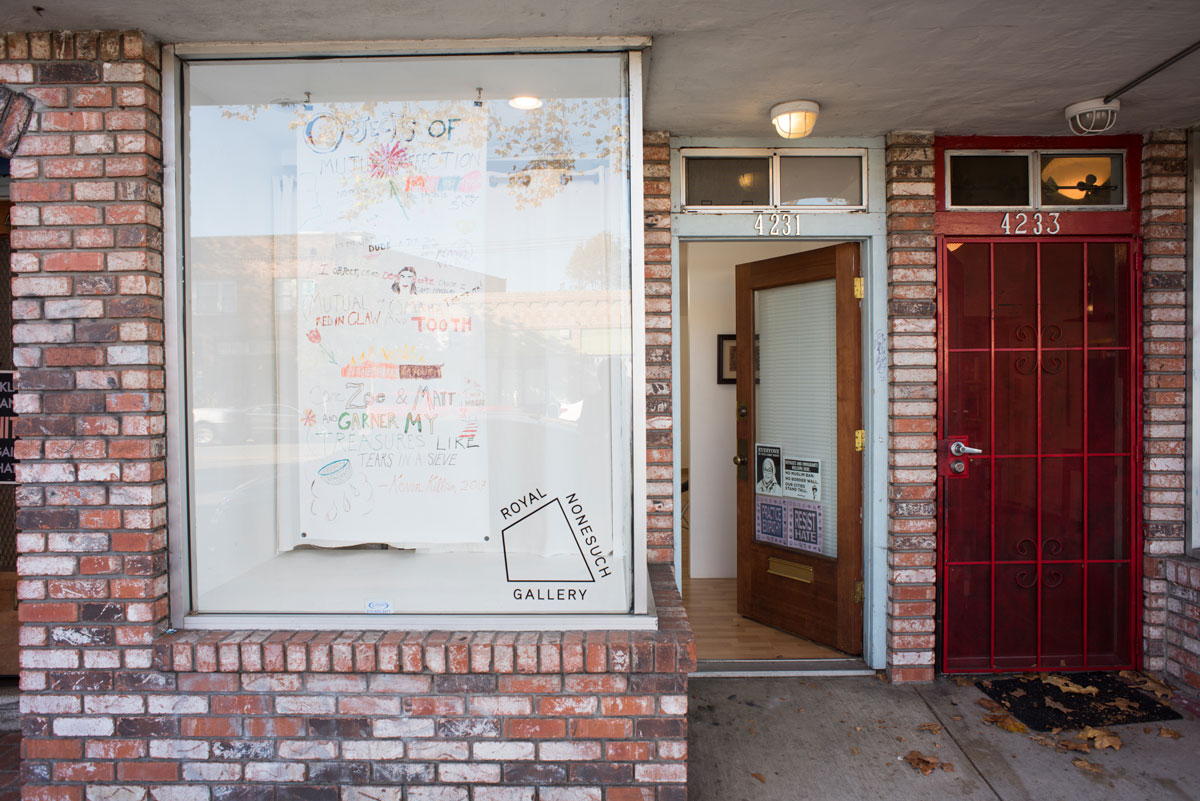
In 2017 I curated an exhibition of art from the personal collections of New Narrative writers. I spent a spring afternoon with Kevin and Dodie in their apartment—overfull with art and books, a bounty cultivated from friendships and relationships built over the years—looking at a selection of pieces they had pulled together. Faced with such an embarrassment of riches, I was nervous—logistically, the show was very DIY, and here I was, being trusted with objects of great personal value. Kevin likely sensed this, and, being the consummate host, started telling gossipy anecdotes about the provenance of each piece. I soon noticed my formality being shed like an overly warm sweater, such was the effect of his charm and his trust.
When it came time to figure out what to do with the gallery’s front window, I asked Kevin if he would be willing to write one of his large-scale poem drawings to act as a kind of preface to the show. Without hesitation he gladly agreed. A friend recently posted a photo of the edition we made of that poster (I was hoping to one day ask Kevin to touch up the now sun-bleached original). Rereading his words of welcome, I think about how often I saw him take to the role of greeter, emcee and hype-man when it came to other people and their work. He was an ecumenical enthusiast, constantly interested in what others were doing. He was also generous in spreading around opportunities. I moderated the panel at the CJM where Eileen Myles first met Jill Soloway; I spoke about Jess at SFMOMA because he passed along those gigs to me. There’s an old punk saying: support the scene that supports you. That was Kevin in a nutshell.
—Matt Sussman, writer and curator

I had the pleasure of being in many of Kevin’s plays in the nearly 30 years I knew him, and we even authored a few together. When we wrote, he was always playful, generous and buoyant. We’d meet regularly on a weekend morning and chat a while about local artists, or Kylie Minogue, or maybe a bad TV show we had both watched. Then he’d begin typing and almost supernaturally start to breathe life into whatever ideas we happened to let float into the room that day. He gently chastised me once, when I tried to impose some leaden details onto a plot line: Wayne, I do these plays because I want to have fun! And it was, of course, the greatest fun to concoct these lo-fi otherworlds with him. Places that resisted perfection, inhabited by the likes of Emily Dickinson, Valerie Solanas, Ernest Borgnine, Angela Bowie, mimes, clowns and members of an errant Shaker community. More than once, we laughed out loud at what we had just written. Dearest Kevin, you were so much fun!
—Wayne Smith, artist
Last year I gave a practice-theory talk for NYU’s cinema studies department. Oh, how I made all sorts of improbable connections!
Afterwards, someone pulled me aside. “Are you from San Francisco? Do you know Kevin Killian? Your links, your sense of humor remind me of his.”
An angel at my table: KK, a guy always just right beside you.
—Emily Jain Wilson, artist
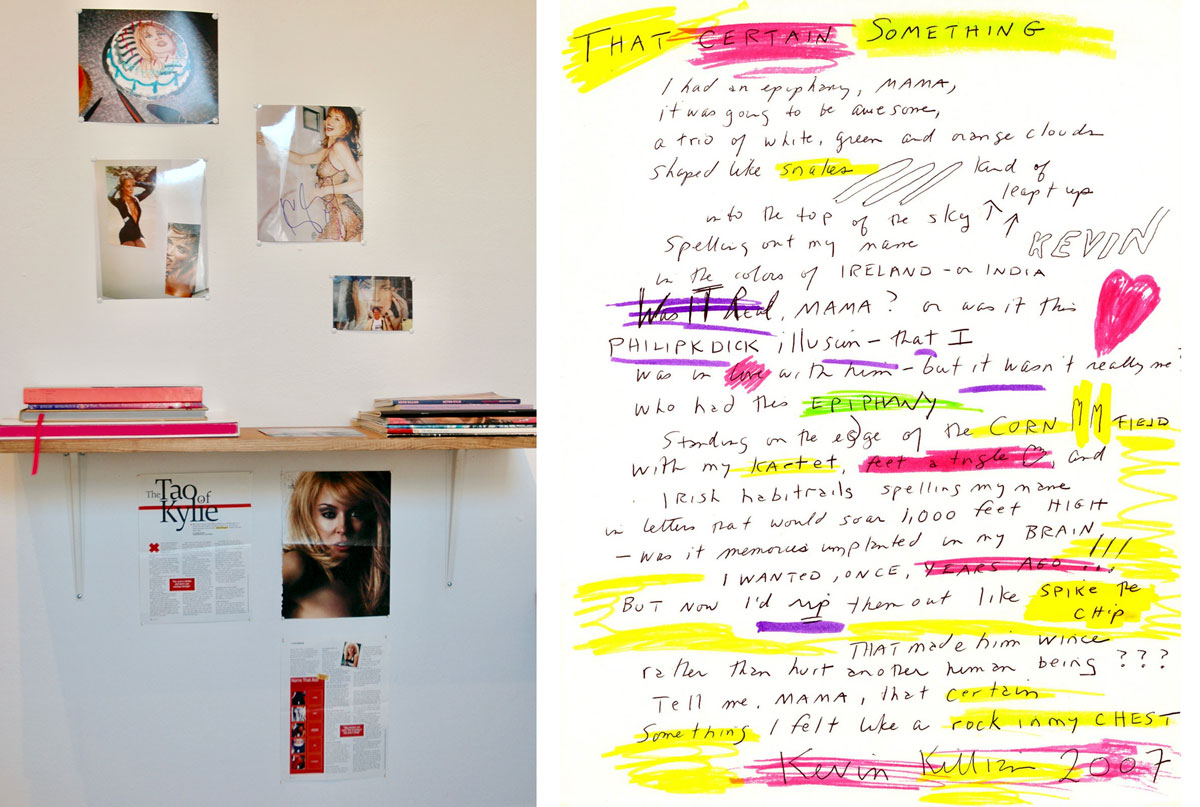
While assembling his shelf of Kylie Minogue memorabilia, fan fiction, and incantations for my Lending Library exhibition at Adobe Books, Kevin Killian spoke of inhabiting Kylie’s persona—becoming possessed by her and perhaps possessing her as well—pop star/queer sex siren and celebrated poet of the underground at once. At that moment, I saw him as in his body but not of his body, both real and also reverberant of the many stories, enthusiasms and personas that commingled just long enough to give him form. He made himself available to us in the most profound way. I hope that we always remain available to him.
—Dena Beard, director of The Lab
I don’t really know what I was feeling. I was shy and excited. It was 2003. I called Kevin. In 1993, the Bay Area seemed like magic to me. I was living in Providence, I had been in Boston before that. The Bay Area was a truth I loved, but couldn’t (yet) reach. I gave a reading at Small Press Traffic, and Kevin introduced me. I was stunned by how deeply, how wisely, how wryly, how clearly he understood what I was writing and what I was. Ten years later, I was living in Michigan, and I was going to move to the Bay Area for a job. I was thrilled and scared. I had one more day in town. I called Kevin. He said let’s meet at SFMOMA. We spent the afternoon there, and I knew my life was going to be fine.
—Joseph Lease, poet
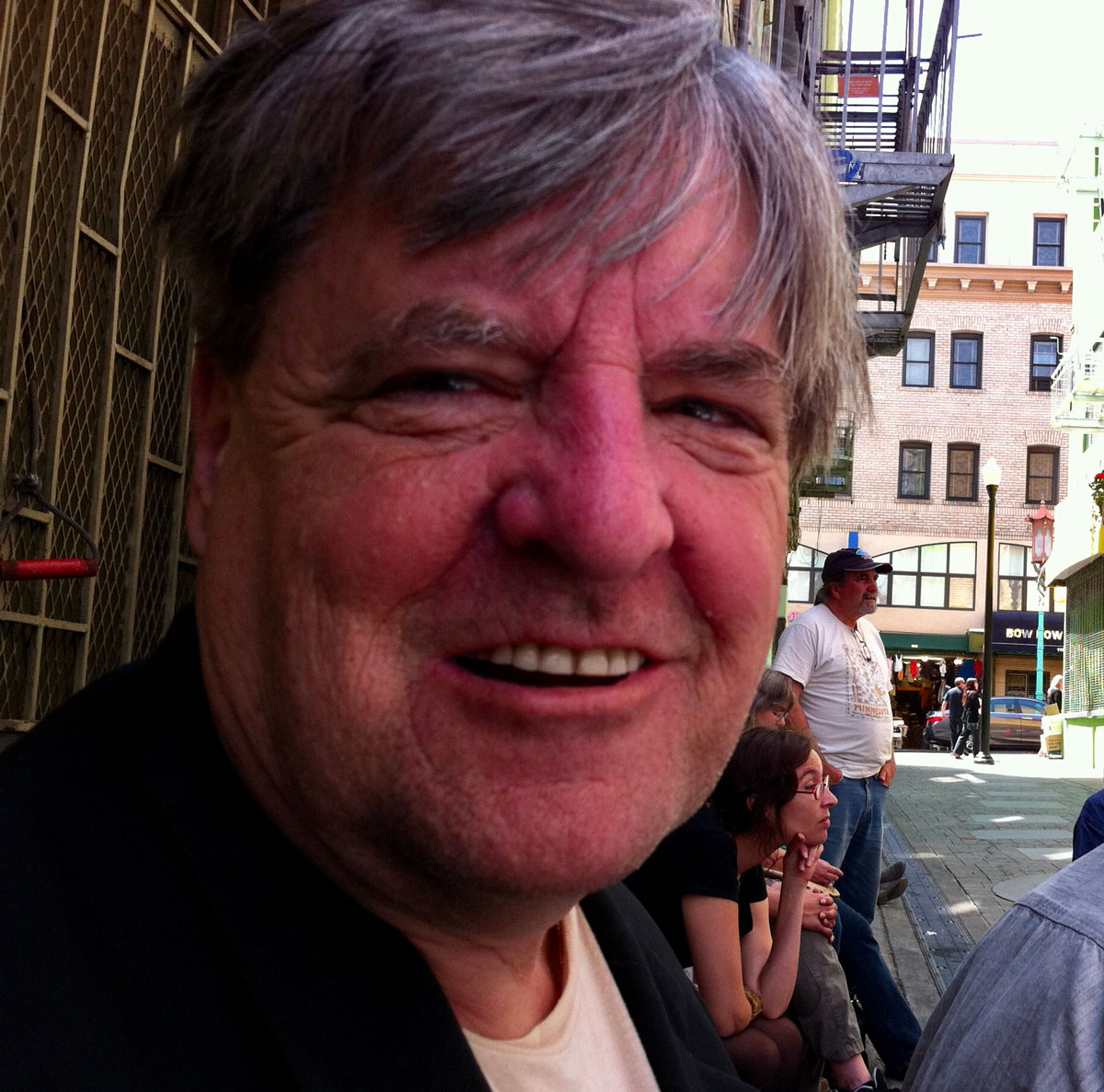
It was a bright, sunny Sunday, August 2014. We were in Jack Kerouac Alley (formerly Adler Alley), the alley that runs along the downside of City Lights Bookstore in North Beach, San Francisco. A stage was set up, Alli Warren was reading from her new City Lights Spotlight Series book. People were coming and going, or staying around for the reading. I’m a fan so I was there, and of course Kevin was there because he was always there—interested, involved, supporting what everyone was up to. Absolutely Kevin.
—Norma Cole, poet
In the breathtaking geyser of love and tributes to Kevin Killian I read in the days since he left the world, I have seen a story repeated over and over again. It’s mine too. By the conclusion of our first conversation 15 or more years ago, he had invited me to help him work on what would become My Vocabulary Did This To Me: The Collected Poetry of Jack Spicer. That improbable, casual, immortal act of generosity and inclusion changed my life forever, introducing me to the mutable and various scenes of Bay Area writing communities and beyond. What Kevin offered me, and so many of us, was encouragement. But I don’t mean that in the tepid stupid way you might be “encouraged” by your boss or whatever. I mean Kevin literally gave us courage, which literally means he gave us heart. I am awed that he gave so many of us heart. This was just one of Kevin’s magical powers, to enlarge and improve the hearts of those around him. In this respect, Kevin was a wizard. I loved this wizard, and hate the world so diminished by his loss.
—Brandon Brown, writer
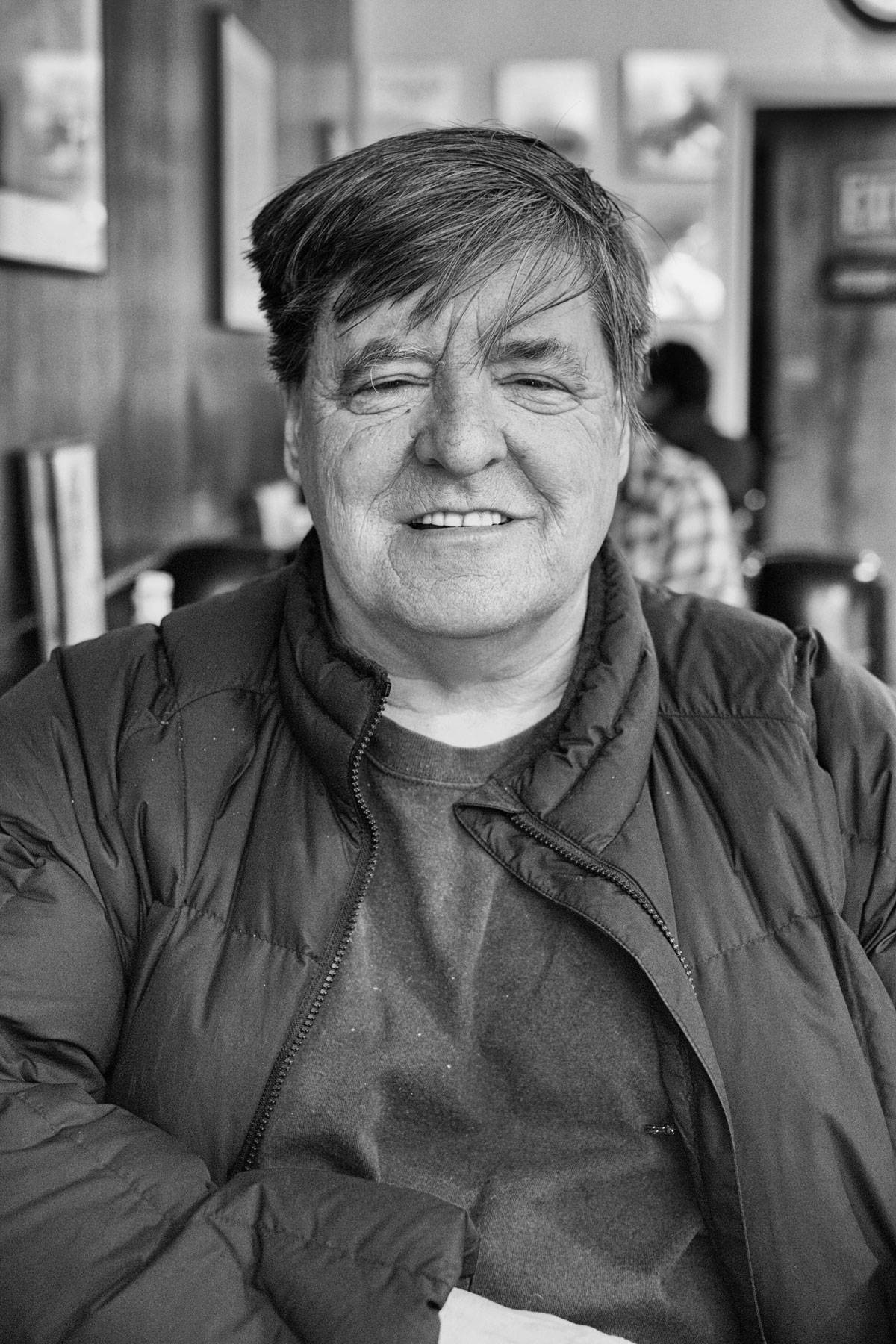
To those who didn’t know him, it is difficult to convey the extraordinary intensity of the connections Kevin made with people—an intimacy whose depth carried with it a sublime whimsy, much as in his work. He was such a generous, heedful interlocutor, as intent to listen as he was to respond, and every moment with him seemed impossibly generative, regardless of the circumstance—posing for him, reading with him, just being in his presence and seeing through his eyes. For me, as for so many others, meeting Kevin proved a life-changing entrance into solidarity, as well as an opening to a community whose mechanisms can seem so dauntingly obscure at first approach. He brought people together, drawing lines across aesthetic and personal differences, eager to share the limelight which he loved and in which he shined so brightly. He was a singular mind and presence, and the glow of his affection has brightened every corner of my life; this city, this community, this world seem unimaginable without him.
—Steven Seidenberg, artist and writer
I have been away from San Francisco a lot lately and when I recently returned I couldn’t find my bearings. Usually I feel situated in the city by picturing where my friends are: Norma in Noe Valley, Margaret down the hill, Kathleen in North Beach, Amy and Susan T in Bernal, Steve out at The Poetry Center, Eleni across the bridge, Kevin and Dodie in SOMA, and the roll call continues… But with Kevin it’s more that his presence is like a neighborhood in itself—a whole benevolent environment and atmosphere to expect, to check in with before or after a reading, art opening, or at a party—and you could count on him being at almost every poetry event. So there I was in the very familiar Rainbow grocery feeling utterly disoriented. I realized that it was because two S.F. neighborhoods had disappeared from the map: Kevin—and Kathleen Fraser a few months earlier.
Kevin was a public poetry world all unto himself. I know of no one else who was/is out in that world as much as he was. I feel like I grew up near Kevin—and many others—who I saw at least a few times a month at readings or parties over a 35-year span. That’s often enough to barely detect aging! I am more familiar with them and saw/see them more often than I see most of my blood relatives. As the ultimate gracious emperor and lightening rod of a world essential to our survival, I cannot thank Kevin enough, or begin to find words for how much he will be missed by me and hundreds more.
–Susan Gevirtz, writer
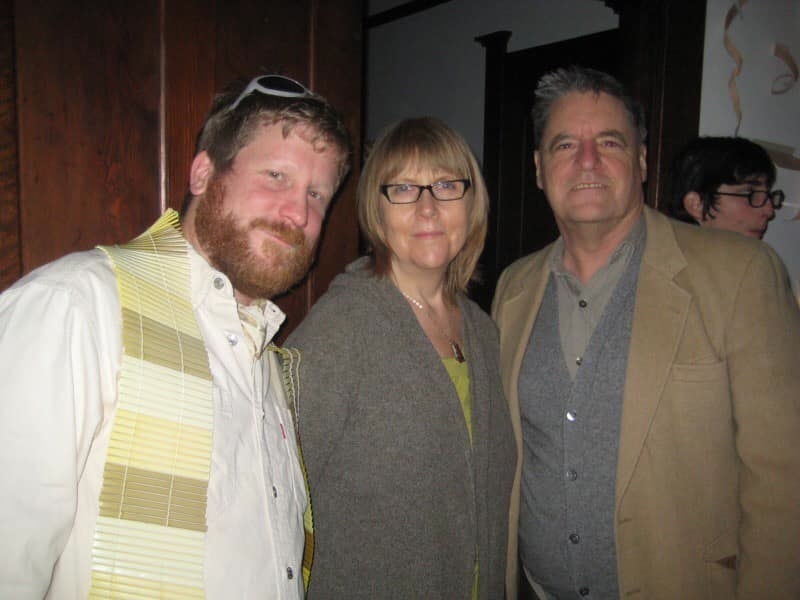
I met Kevin in the early ’90s shortly after moving to San Francisco and soon became ensconced in a vibrating circle of queer artists and writers largely centered around the short-lived but legendary Kiki Gallery and the In a Different Light bookstore in the Castro. Our shared sensibilities of poetic pathos, trashy celebrity and transcendent camp amid the tragic devastation of the AIDS crisis bonded all of us together and gave us space to collaborate and support each other’s work.
By then Kevin and his wife Dodie were already the center of a burgeoning literary movement of the New Narrative and I couldn’t imagine an avant-garde more playful, inviting and unpretentious than theirs. Seizing on my background as a failed actor, Kevin first cast me as River Phoenix in his play Three On A Match, and over 25 years as a member of the San Francisco Poets Theater I performed in dozens of Kevin’s plays as Tuesday Weld, Linda McCartney and Janis Joplin, amid many others roles great and small. Always with the gleaming invitation, “Scott, have I the role for you, you’ll be just perfect!” How could I refuse?
—Scott Hewicker, artist
I saw Kevin a few weeks ago. Karla Milosevich was back in town, and we were all very excited to see her after a few months of being away, having moved to Santa Fe. So when Karla asked us all out to lunch we jumped. I was lucky enough to grab a seat directly across from Kevin, and I wanted to talk to him, he had been in and out of the hospital. I asked him about the obituary he had written for Lutz Bacher in Frieze (if you haven’t read it yet, you should, truly a work of art unto itself). He told me about everything he deliberately left out of the article, which was quite fascinating, such a glorious mix of fact, gossip and pathos. As we wrapped up the lunch I hugged him, and he whispered to me, “you were always my favorite star.” That shook me, there was an undeniable sense of finality in that statement. I watched him walk away. That was the last time I saw him.
—Cliff Hengst, artist

If you would like to share a specific memory for inclusion on this page, please email shotchkiss@kqed.org.

